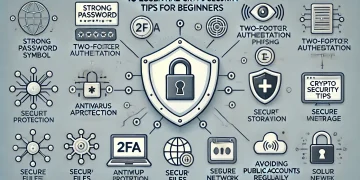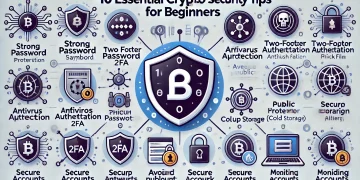As the cryptocurrency market continues to evolve and mature, the importance of secure and user-friendly wallets has never been greater. In 2024, crypto enthusiasts and investors have a wide array of options to choose from, each with its own unique features and benefits. This comprehensive guide will walk you through the best cryptocurrency wallets available in 2024, helping you make an informed decision based on your specific needs and preferences.
Understanding Cryptocurrency Wallets
Before diving into the best wallets of 2024, it’s crucial to understand what cryptocurrency wallets are and how they work.
What is a Cryptocurrency Wallet?
A cryptocurrency wallet is a digital tool that allows users to store, send, and receive various cryptocurrencies. However, unlike traditional wallets, crypto wallets don’t actually store your coins. Instead, they store the private keys that give you access to your cryptocurrency on the blockchain.
Types of Cryptocurrency Wallets
- Hardware Wallets: Physical devices that store your private keys offline.
- Software Wallets:
- Desktop Wallets: Applications installed on your computer.
- Mobile Wallets: Apps on your smartphone.
- Web Wallets: Accessed through a web browser.
- Paper Wallets: Physical documents containing your public and private keys.
- Brain Wallets: Memorized passphrases used to access your crypto.
Key Features to Consider
When choosing a cryptocurrency wallet, consider the following factors:
- Security: The level of protection against hacks and theft.
- User Interface: How easy and intuitive the wallet is to use.
- Supported Cryptocurrencies: The range of coins and tokens the wallet can store.
- Transaction Fees: Any costs associated with sending or receiving crypto.
- Backup and Recovery Options: Methods for recovering your wallet if lost or damaged.
- Integration with Exchanges: Ability to connect directly with cryptocurrency exchanges.
- Additional Features: Such as built-in exchanges, staking options, or DApp browsers.
Top Hardware Wallets of 2024
Hardware wallets remain the gold standard for security in 2024. Here are the top contenders:
1. Ledger Nano X
Pros:
- Bluetooth connectivity for mobile use
- Supports over 5,500 assets
- User-friendly Ledger Live interface
- Built-in battery for on-the-go use
Cons:
- Higher price point compared to some competitors
- Bluetooth feature may be a security concern for some users
Best for: Investors with a diverse portfolio who value both security and convenience.
2. Trezor Model T
Pros:
- Touchscreen interface for easy navigation
- Open-source software for transparency
- Supports over 1,800 cryptocurrencies
- Integrated exchange feature
Cons:
- More expensive than its predecessor, the Trezor One
- No wireless connectivity options
Best for: Security-conscious users who prefer a touchscreen interface and open-source software.
3. KeepKey
Pros:
- Large display for easy verification
- Sleek, minimalist design
- Competitive pricing
- Integration with ShapeShift exchange
Cons:
- Supports fewer cryptocurrencies compared to Ledger and Trezor
- Less frequent firmware updates
Best for: Users looking for a balance between security, aesthetics, and affordability.
Top Software Wallets of 2024
Software wallets offer greater convenience and are often free to use. Here are the standout options in 2024:
1. Exodus
Type: Desktop and Mobile Wallet
Pros:
- User-friendly interface with customizable themes
- Built-in exchange feature
- Supports over 200 cryptocurrencies
- Regular updates and responsive customer support
Cons:
- Closed-source software
- Higher transaction fees for built-in exchange
Best for: Beginners and intermediate users who prioritize ease of use and visual appeal.
2. Trust Wallet
Type: Mobile Wallet
Pros:
- Official wallet of Binance
- Supports a wide range of cryptocurrencies and tokens
- Built-in DApp browser and DEX
- Staking options for certain cryptocurrencies
Cons:
- Mobile-only, no desktop version available
- Some advanced features may be overwhelming for beginners
Best for: Mobile-centric users who want access to DApps and decentralized exchanges.
3. MetaMask
Type: Browser Extension and Mobile Wallet
Pros:
- Seamless integration with Ethereum-based DApps
- Easy-to-use interface for sending and receiving ETH and ERC-20 tokens
- Open-source software
- Strong community support and regular updates
Cons:
- Primarily focused on Ethereum and EVM-compatible networks
- Has been a target for phishing attacks due to its popularity
Best for: Ethereum enthusiasts and DApp users.
4. Atomic Wallet
Type: Desktop and Mobile Wallet
Pros:
- Supports over 300 cryptocurrencies
- Built-in atomic swap feature for decentralized exchanges
- Staking options for certain cryptocurrencies
- User-friendly interface with portfolio tracking
Cons:
- Closed-source software
- Some users report syncing issues
Best for: Users looking for a feature-rich wallet with a wide range of supported cryptocurrencies.
Top Web Wallets of 2024
Web wallets offer the convenience of accessing your crypto from any device with an internet connection. Here are the top choices:
1. MyEtherWallet (MEW)
Pros:
- Open-source and community-driven
- Supports Ethereum and all ERC-20 tokens
- Integration with hardware wallets
- Access to DApps and DeFi platforms
Cons:
- Limited to Ethereum and EVM-compatible networks
- Requires careful handling to ensure security
Best for: Ethereum users who want easy access to their funds and DApps.
2. Guarda Wallet
Pros:
- Multi-currency support with over 50 blockchains
- Built-in exchange and purchase options
- Web, desktop, and mobile versions available
- Non-custodial with client-side encryption
Cons:
- Some advanced features may be confusing for beginners
- Transaction fees can be high for certain operations
Best for: Users seeking a versatile web wallet with multi-platform support.
Emerging Trends in Cryptocurrency Wallets
As we move through 2024, several trends are shaping the future of cryptocurrency wallets:
1. Enhanced DeFi Integration
Wallets are increasingly integrating direct access to decentralized finance (DeFi) protocols, allowing users to participate in lending, borrowing, and yield farming directly from their wallets.
2. Improved Cross-Chain Compatibility
With the growing importance of interoperability, wallets are developing better support for cross-chain transactions and asset management.
3. Advanced Security Features
Biometric authentication, multi-signature support, and AI-driven fraud detection are becoming standard features in many wallets.
4. Social Recovery Options
Some wallets are implementing social recovery systems, allowing users to regain access to their funds through trusted contacts if they lose their private keys.
5. Layer 2 Integration
As layer 2 scaling solutions become more prevalent, wallets are adding native support for these networks to enable faster and cheaper transactions.
Choosing the Right Wallet for You
Selecting the best cryptocurrency wallet depends on your individual needs and circumstances. Consider the following factors:
- Security Priorities: If security is your top concern, a hardware wallet might be the best choice.
- Frequency of Transactions: For frequent traders, a mobile or web wallet might offer more convenience.
- Types of Cryptocurrencies Held: Ensure the wallet supports all the cryptocurrencies you own or plan to acquire.
- Technical Expertise: Some wallets are more user-friendly for beginners, while others offer advanced features for experienced users.
- Budget: Hardware wallets come at a cost, while many software wallets are free.
- Intended Use: Consider whether you’ll be using DApps, participating in DeFi, or simply holding long-term investments.
Best Practices for Wallet Security
Regardless of the wallet you choose, following these security best practices is crucial:
- Enable Two-Factor Authentication (2FA) where available.
- Regularly Update your wallet software to the latest version.
- Use a Strong, Unique Password for each of your wallets.
- Back Up Your Wallet and store the backup in a secure location.
- Be Cautious of Phishing Attempts and always double-check URLs and email sources.
- Consider Using a Hardware Wallet for large holdings.
- Never Share Your Private Keys or Recovery Phrase with anyone.
Conclusion
The cryptocurrency wallet landscape in 2024 offers a diverse range of options to suit every type of user, from beginners to advanced crypto enthusiasts. Hardware wallets like the Ledger Nano X and Trezor Model T continue to set the standard for security, while software wallets such as Exodus and Trust Wallet offer convenience and feature-rich experiences.
As the crypto ecosystem evolves, wallets are becoming more than just storage solutions – they’re evolving into comprehensive platforms for managing digital assets, interacting with DeFi protocols, and navigating the broader blockchain landscape.
When choosing a wallet, it’s essential to consider your specific needs, prioritize security, and stay informed about the latest developments in wallet technology. By selecting the right wallet and following best security practices, you can ensure that your cryptocurrency journey in 2024 and beyond is both secure and rewarding.
Remember, the best wallet for you is one that balances security, convenience, and functionality in a way that aligns with your personal crypto strategy. As the market continues to evolve, stay informed and be prepared to adapt your wallet choices to meet your changing needs.
Frequently Asked Questions (FAQs)
- What’s the difference between a hot wallet and a cold wallet? A hot wallet is connected to the internet (like mobile or web wallets), while a cold wallet is kept offline (like hardware wallets). Cold wallets are generally considered more secure but less convenient for frequent transactions.
- Can I use multiple wallets for my cryptocurrencies? Yes, many users choose to use multiple wallets – for example, a hardware wallet for long-term storage and a mobile wallet for everyday transactions.
- Are cryptocurrency wallets free? Many software wallets are free to use, though they may charge transaction fees. Hardware wallets require an upfront purchase but typically don’t charge ongoing fees.
- What happens if I lose my wallet? If you lose a physical device or forget your password, you can usually recover your funds using your recovery phrase (also known as a seed phrase). This is why it’s crucial to securely back up your recovery phrase.
- Can cryptocurrency wallets be hacked? While wallets themselves are generally secure, they can be vulnerable if private keys are not properly secured. Hardware wallets offer the highest level of security against hacking.
- Do I need a separate wallet for each cryptocurrency I own? Not necessarily. Many wallets support multiple cryptocurrencies, allowing you to manage various assets in one place. However, some cryptocurrencies may require specific wallets.
- What’s the best wallet for beginners? For beginners, user-friendly software wallets like Exodus or Trust Wallet are often recommended due to their intuitive interfaces and educational resources.
- How often should I update my wallet software? It’s best to update your wallet software whenever a new version is released. These updates often include important security patches and new features.
- Can I access my hardware wallet without the physical device? Generally, no. The purpose of a hardware wallet is to keep your private keys offline. However, some hardware wallet manufacturers offer companion apps that allow you to view your balance without the device.
- What should I consider when choosing a wallet for DeFi interactions? For DeFi, look for wallets with built-in DApp browsers, support for multiple networks (especially Ethereum and other smart contract platforms), and easy integration with popular DeFi protocols.



























